
Today is the 11th Armistice Day I will observe as a veteran. I only recently found the courage to speak up against the US-led wars being fought around the world. It took me so long to speak up because I was scared. I was scared of losing the respect of my family, and of losing the handful of social benefits that accompany being a compliant, “heroic” veteran worthy of uncritical cheers and applause at sporting events and airports. But I was tired of hiding and pretending that being honest about my military experience was less important than social approval, so I learned to speak out. It began with a few articles, which led to a book. The book led to speaking engagements at high schools, prisons and universities. Now it almost feels like second nature to challenge the notion that the United States military is a force for good, or that it fights for freedom and democracy around the world.
The support from like-minded veterans and activists who also speak out against US imperialism — the lives it takes, the racism it fuels, the economic inequality it creates and the damage it does to the environment — was the most important part of my evolution. These antiwar veterans helped me do battle with the fear of isolation that kept me silent. They are the ones who gave me courage. The idea that I was in it alone was a false one. Losing this feeling, I think, was the first step to speaking out.
Fifteen years ago, the US invaded Afghanistan, allegedly to capture the handful of people responsible for 9/11. A decade and a half later, hundreds of thousands of lives have been lost, other wars have been fought and a vast national security state has been built up around us. Trillions of dollars have been diverted from things like health care, education, infrastructure, fighting climate change and more. And now, a rightwing demagogue has been elected president of the US.
How do we prevent a repeat of the last 15 years? How do we fight the creeping cynicism so many of us feel regarding our ability to stop the damage the US military does around the world? What are some of the obstacles faced by veterans since returning home? What are the challenges that prevent veterans from speaking against the vicious and brutal cycle of war in this country? Now, more than ever, these questions need answers.
In my talks with students I am always encouraging them and their teachers to come together and organize space for veterans to share their stories. No, it isn’t easy for veterans who want to communicate the realities of war to the soon-to-be military-aged kids who need to hear them the most. Ask any number of the millions of young people signed up for the Junior Reserve Officer Training Corps program a few questions about our country’s recent history. You’ll soon realize how little information is being shared with those who will be tasked with fighting the next decade and a half of wars — if those wars are not stopped.
The problem is that there is plenty of time for parades, backslapping, yellow ribbons and other propaganda, but very little time to hear the horrors of war. So, I thought I would heed my own advice. This Veterans Day, I reached out to a few of my favorite vets, and asked them about the challenges they’ve faced since leaving the military, what needs to happen to end the wars, and their greatest fear about speaking out. Hopefully, these voices will reach others who are considering speaking out, the young people who are being denied the information they need to make an informed decision about joining the military, and the active duty soldiers who are contemplating laying their weapons down and coming home. Maybe they will see that they are not alone, and that there are wonderful and courageous people out there who will support them.
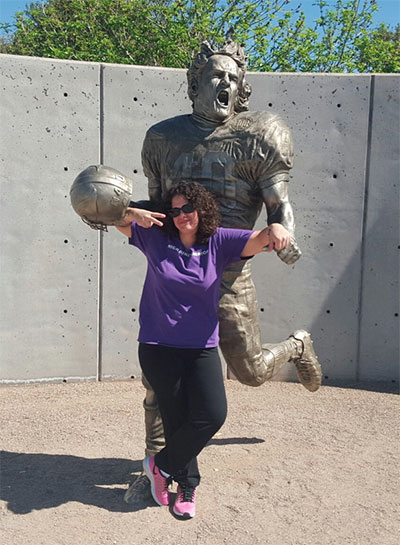 Sabrina Weller in front of Pat Tillman’s statue outside of Phoenix University Stadium. (Photo: Courtesy of Rory Fanning) Sabrina Bosques, Navy Veteran, Kosovo Conflict ’99
Sabrina Weller in front of Pat Tillman’s statue outside of Phoenix University Stadium. (Photo: Courtesy of Rory Fanning) Sabrina Bosques, Navy Veteran, Kosovo Conflict ’99
The biggest challenge after coming home is believing I was the only one having these feelings of disgust with my time in the military. I was in an F-14 fighter squadron in the Navy. They showed us pictures and videos of the damage the 500 pounds [of explosives] dropped from the F-14 had on the Balkan Area. They wanted us to be proud. I was sickened. I knew there were women and children who died because of missions I supported. I kept asking myself, what does this have to do with Chicago (where I’m from), or the United States? How am I upholding the Constitution by bombing a country I know nothing about in a war that clearly is not about self-defense?
I was one of 500 females aboard an aircraft carrier of 5,000 sailors during the Kosovo conflict; I think that says all you need to know about what an average day during a deployment felt like. Another sailor sexually assaulted me. Statistics state one in three women are sexually assaulted in the military. Even though I was far from alone in my experiences, I couldn’t publicly admit I was a MST (military sexual trauma) survivor until after I was re-traumatized during an inpatient psych visit at my local VA [Veterans Affairs clinic].
I challenge the idea that war is inevitable, or that abuse is inevitable.
I did humanitarian work with the real Patch Adams — without a weapon — in Guatemala and Costa Rica, after leaving the military. This brought me immense peace and really started my path toward working on wellness. Not only did I feel like I was giving back, I saw how the teachers in Costa Rica, much like the teachers in Chicago Public Schools, learned to withhold their labor [i.e., go on strike] for improved standards of living. This is how we change the world. If we don’t like what our government is doing to us, or the wars it’s creating, then we should refuse to go to work until things change.
Also, on that note, when I was in the military I saw three sailors refuse to get an anthrax vaccine [a vaccine that the FDA recommends for at-risk adults before exposure to anthrax and that the CDC says is safe]. I didn’t know it at the time, but I was seeing GI resistance… They ultimately refused their order. They should have that right. These young sailors were kicked out of the military. They stood up against the chain of command. We need to see more of this. The wars stop when service members refuse to obey orders.
Having inadequate mental health care after returning home was my biggest obstacle, and the VA is still a trigger. You would go into the women’s clinic for treatment and you walk into a room full of men. For Veterans receiving treatment for Military Sexual Trauma (MST), this ain’t healing.
Will Griffin, US Army Paratrooper, deployed to Iraq/Afghanistan
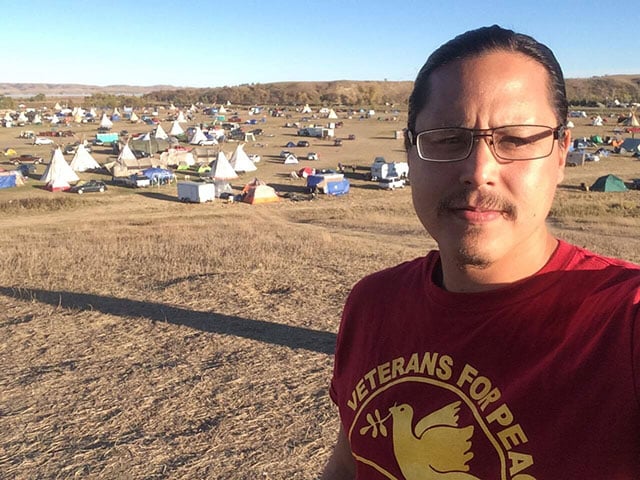 Will Griffin at Standing Rock protesting the Dakota Access Pipeline. (Photo: Courtesy of Rory Fanning)
Will Griffin at Standing Rock protesting the Dakota Access Pipeline. (Photo: Courtesy of Rory Fanning)
The last 15 years of war haven’t worked. Global terrorism has since increased, the world is a more dangerous place and Americans are more fearful than ever before.
A complete reversal is in order. Sending our troops overseas hasn’t worked. Dropping bombs on entire countries hasn’t worked. Feeding weapons to rebel groups hasn’t worked. Let’s stop endangering the world. Fifteen years is enough!
One of the greatest obstacles/fears about speaking out against the wars, before I chose to do so, was being ridiculed, alienated and losing friends. All of this did in fact happen. But all the friends I met since then quickly filled much of that void — people who had the courage to speak out against America’s unending wars are the ones I spend a lot of my time with now. It hasn’t been easy, but my life is so much more fulfilled since coming forward.
Ross Caputi, Veteran of the second battle of Fallujah, 1/8 alpha co USMC, grad student in comparative lit at University of Massachusetts
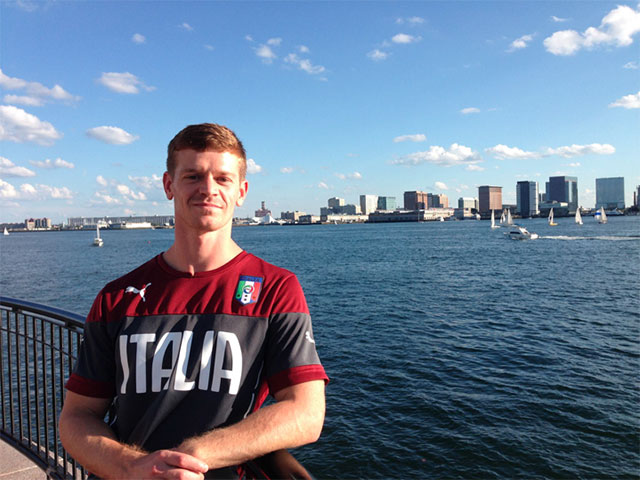 Ross Caputi, Boston, MA. (Photo: Courtesy of Rory Fanning)
Ross Caputi, Boston, MA. (Photo: Courtesy of Rory Fanning)
I think we need to have a moral revolution in this country that totally restructures the way we think about the use of military force. Imperialism is deeply entrenched in our culture. Our perceived right to use violence in other people’s countries is never questioned, and it should be. But even within the progressive community, opposition to our foreign policies is too often framed in terms of domestic costs. I think we need to change our moral culture from one of self-righteousness and self-interest to one of solidarity with our victims.
One of the biggest obstacles/fears to speaking out against US-led wars was that I felt inadequate because of my level of education. I slacked off in high school and didn’t feel like I could put my thoughts into words in a way that others would respect. I worried that I would just end up alienating myself and doing a disservice to Iraqis.
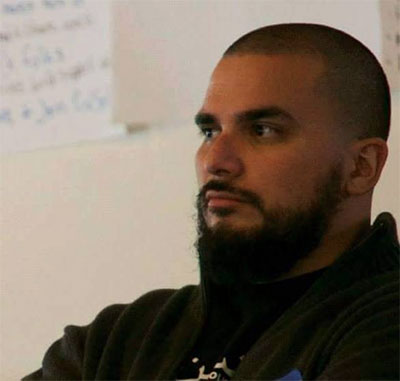 Ramon Mejia. (Photo: Courtesy of Rory Fanning) Ramon Mejia, founding Organizer of #VetsVsHate, Latino Muslim USMC Veteran.
Ramon Mejia. (Photo: Courtesy of Rory Fanning) Ramon Mejia, founding Organizer of #VetsVsHate, Latino Muslim USMC Veteran.
“Instead of galvanizing the public for continued conflict, discuss innovative alternatives to investing our taxpayer dollars rather than continuing to build and maintain military installations overseas. Nearly $600 billion is still spent on supporting the war effort each year! Imagine how reallocating even a fraction of this could help rebuild our country’s crumbling infrastructure! I hope more people speak sincerely and truthfully about the issues we need to confront as a nation. Don’t speak about military threats to our national security while ignoring the ways our foreign policy has created these crises.
To live with the burden that I, by participating in the Iraq War, contributed to the continued oppression and further exploitation of a people — the burden, at times, is more than I can bear. And now by speaking out against the war, against US militarism, I’m called a “traitor” … What the fuck?!? I was lied to by the U.S. government. They lied to me! They took my youth, my humanity, and I’m the traitor?!?
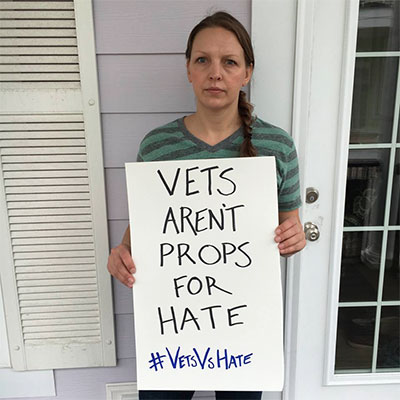 Maggie Martin. (Photo: Courtesy of Rory Fanning) Maggie Martin IVAW Co-Director
Maggie Martin. (Photo: Courtesy of Rory Fanning) Maggie Martin IVAW Co-Director
I think if we don’t want to repeat the last 15 years, we need a real change in how people in the US experience war from such a distance. That could mean increasing people’s understanding about the human and economic costs of war, prioritizing and promoting diplomatic solutions and fully funding the VA to treat those injured in war. We need to have a government that will be accountable to the people about the choice to go to war. We would also need a major shift in mainstream media if we hope to change our militaristic culture.
I didn’t really have too much fear about speaking out against the wars, but I think an obstacle was figuring out how I would be able to make a living while still giving the time and effort I wanted [to] work against the war. I’ve been on staff with IVAW [Iraq Veterans Against the War] for five and a half years, so it’s been great for me, but our members and volunteers still struggle to make time for political work with the challenges of working, going to school and having families. At this point for me, with a one-year-old son, I am finding the right balance of family and movement life.
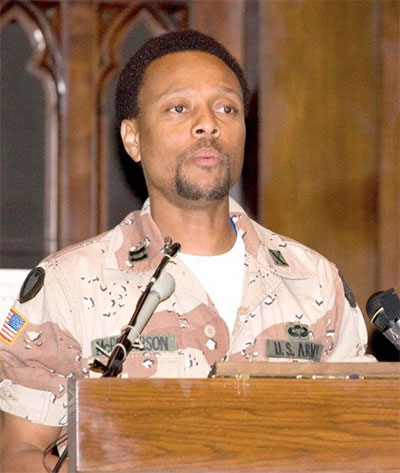 Michael T. McPherson. (Photo: Courtesy of Rory Fanning) Michael T. McPhearson, Veterans For Peace, Executive Director
Michael T. McPherson. (Photo: Courtesy of Rory Fanning) Michael T. McPhearson, Veterans For Peace, Executive Director
What should happen to stop what has been happening for the past 25 years, since the US shrugged off Vietnam Syndrome, and what has been happening since the founding of this nation — i.e., a constant and consistent march to global hegemony?
Activists here at home must understand that all of our issues are intertwined and that we cannot make real change without addressing root causes — what MLK called a revolution of values. We need a transformation of what we value. We must put people before things. Greed must become an anathema. Central to this transformation must be a confrontation of patriarchy that puts the needs of children and sustaining the planet at the center. Together we can have a full-spectrum peoples’ movement that will help everyone see how all of our destinies are connected. And Veterans For Peace must continue to work to build a global movement of veterans who are speaking out against war and violent conflict and for peace. I think if we do these things or even fall short, succeeding only in part, we would see the kind of change we seek.
Departure from war was not my starting place to talk about peace. I once thought war was a necessary evil to help bring about peace. I began to talk about peace as it relates to issues here at home and specifically to my community as a Black man. My mother always taught us to stand up against injustice and for what is right; so when I got out of the military, it was natural for me to begin to speak out against racism and other forms of hate. Then in the summer of 2001, before the World Trade Center tragedy, I saw an activist holding a sign that [said] 500,000 children died as a result of US sanctions in Iraq. I was hit by a thunderbolt. It dawned on me that I am in part responsible for those deaths because I was a tool in the wars that helped put those sanctions in place. From then on I had no choice but to speak out to change US foreign policy as it relates to war and peace. I had some anxiety as to how to do that as a former soldier, but I found Veterans For Peace and many role models like David Cline to emulate.
Matthew Hoh, 2010 Ridenhour Prize winner for Truth-Telling, a former Marine, member of Veterans for Peace
 Matthew Hoh. (Photo: Courtesy of Rory Fanning)
Matthew Hoh. (Photo: Courtesy of Rory Fanning)
How do we prevent a repeat of the last 15 years? I find that to be a very difficult question to answer. The United States and its people, at least the white ruling classes, have always been an expansionist and imperialist. This notion that the United States was an isolationist nation up until the 20th century is nonsense. We didn’t have to have an empire overseas because we were building one through genocide and slavery across the North American land mass. So, I don’t see anything in our history that allows me to say: “This needs to happen as it did then…”
The only thing we can do is to fight on against the forces that will drive us toward such totalitarianism and suffering if we were not to make any resistance. To measure and savor each small victory we achieve, and to believe that we can achieve a better state of humanity and a peaceful world.
Since returning home from the military, my greatest frustration has to be the hero worship that we as veterans are feted with. It is unthinking, reflexive and Orwellian. It is grounded in ignorance, and the enthusiasm with which I find it so often expressed seems to come from a place of mistaken guilt for not having served, or from a place of slavish obedience to cultural and societal dictates that help sustain our military and industrial profligacy and our immoral wars overseas (and at home).
My biggest fear coming forward was that those I have served with would reject me. The reality has been the opposite. I don’t believe I have lost any friendships, and I have been accepted and respected by my former peers.
Those who have been hostile have usually brought their hostility forward from a place of immaturity or ignorance about the reality of the wars. I’ve met few combat vets [who] have disputed my assessment of the wars, while those [who] never went and actually saw the wars are the ones who disagree with me. I think many Americans would be surprised at the high number of members of our Armed Forces who disagree with the wars, but still participate in them.
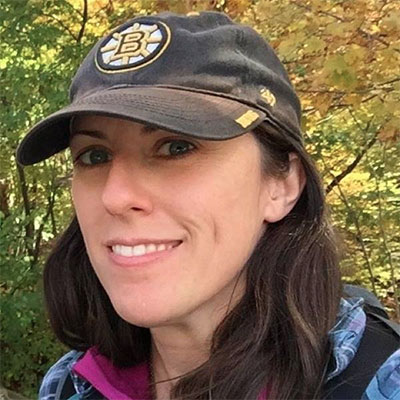 Adrienne Kinne Cascade Mountain, Adirondacks, NY on October 11, 2015. (Photo: Courtesy of Rory Fanning) Adrienne Kinne, US Army 1994-1998, US Army Reserves 1998-2004, stateside, mobilization 2001-2003, Arabic Linguist, Sergeant, E-5
Adrienne Kinne Cascade Mountain, Adirondacks, NY on October 11, 2015. (Photo: Courtesy of Rory Fanning) Adrienne Kinne, US Army 1994-1998, US Army Reserves 1998-2004, stateside, mobilization 2001-2003, Arabic Linguist, Sergeant, E-5
The last 15 years of endless war, increasing wealth disparity, environmental assault and rise in hate and prejudice did not happen overnight, and they are not isolated incidents. They are all outcomes of a power structure that was put in place when our country was founded, and that has favored the rich and powerful few at the expense of the masses. I believe that for real change to happen, we need to abandon the idea that, if we can only get the right person into office, that he or she will make things better for us. Real change in this country has only ever happened through committed and persistent grassroots organizing, rooted in the belief that change is possible.
I joined the military right out of high school. In the beginning I thought that the military would be my career. When I realized I could no longer in good conscience follow that path, I had to figure out anew who I was going to be in life. That was a challenge, practically and emotionally. The bigger challenge, however, was riding the emotional wave that hit as I came to the deeper realization that so much of what I believed to be good about America and serving in the military was a lie. I had to relearn almost everything I thought I knew. Fortunately in doing so, I discovered that there is so much to be proud of as an American — there’re just not the things we’re typically taught in history class.
When I finally decided that signing petitions and making “get out the vote calls” was not enough to alter the path that our country was going down and made the decision to step forward physically and say “enough,” it seemed like an almost natural progression in my activism against the war. It felt like it had to be done and that it was the right thing to do. It was only after I made that first step and connected with other veterans organizing against the wars that I feared being demonized, losing my job, going to jail, and ostracizing my friends and family. I have not gone to jail yet, but the idea of it no longer scares me. I have been called a liar, and my job has been threatened, but there are worse things in life. And my activism has strained my relationships with some friends and family. So be it. My real friends and family have stood by me, and I have found new friends and family the world over who are committed to the same ideals as I am. My greatest fear now is that in trying to find balance in life I have stepped too far back from activism.
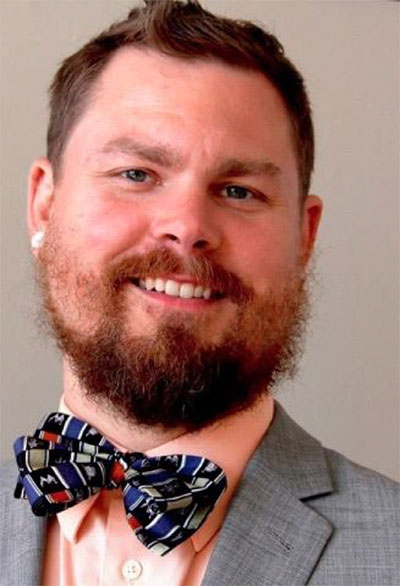 Geoff Millard. (Photo: Courtesy of Rory Fanning) Geoff Millard Iraq war veteran and former member of IVAW
Geoff Millard. (Photo: Courtesy of Rory Fanning) Geoff Millard Iraq war veteran and former member of IVAW
“One of the biggest problems is that people claim to ‘support the troops,’ but those who speak out are largely unheard… If we are going to break the status quo, and avoid a repeat of the last 15 years, we have to learn to communicate with each other better. Yelling at people about how their politics are wrong, if you don’t agree with them, isn’t going to win enough people to reverse the current tide. We have to start having honest and real conversations with those who may not be on the same page but have an open mind.
One of the biggest challenges I have faced since returning from Iraq is losing touch with long-time family and friends. Not a single family or friend from my past attended my wedding. There is a distance in my heart that makes it difficult to maintain or feel connected with people…. The thing that has helped me the most is working with homeless veterans. Besides, so many of my friends who also served are dead from suicide. I am in a constant state of physical and emotional pain…
Garett Reppenhagen, US Army, Operation Enduring Freedom
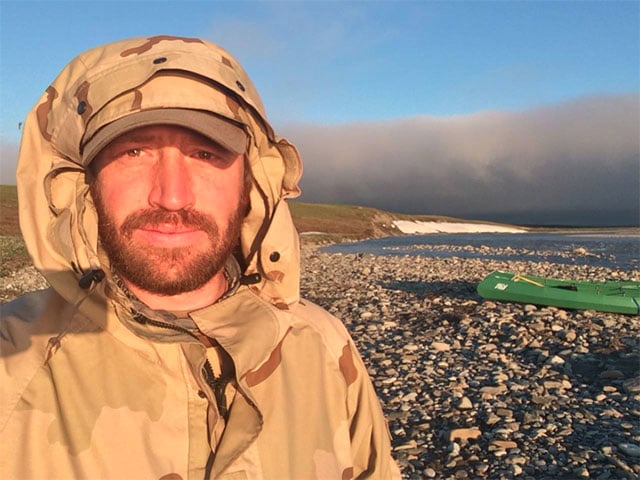 Garrett Reppenhagen, Arctic National Wildlife Refuge, Alaska. (Photo: Courtesy of Rory Fanning)
Garrett Reppenhagen, Arctic National Wildlife Refuge, Alaska. (Photo: Courtesy of Rory Fanning)
To avoid another 15 years of US forces in armed conflicts, America will have to find the courage to not engage every would-be terrorist organization that threatens the western world. We would have to take immediate massive action to support clean renewable energy sources to end our fossil fuel dependence that takes immense military resources to secure. We would need to lower the impact of our military industry in political elections by repealing Citizen United. We must end the post 9/11 war powers act that allows the president to use aggressive action indiscriminately around the world.
The most trying time in my life was returning from Iraq and learning to forgive myself for my role as a sniper in Operation Iraqi Freedom. In a sense I did not experience being a victim of trauma, but I was a perpetrator of violence on others. My mental health is directly tied to the legitimacy of the conflict I was in. For my part in it, I will be challenged by moral injury for the rest of my life.
Mike Haines, Marine Force Recon, Member of Veteran for Peace
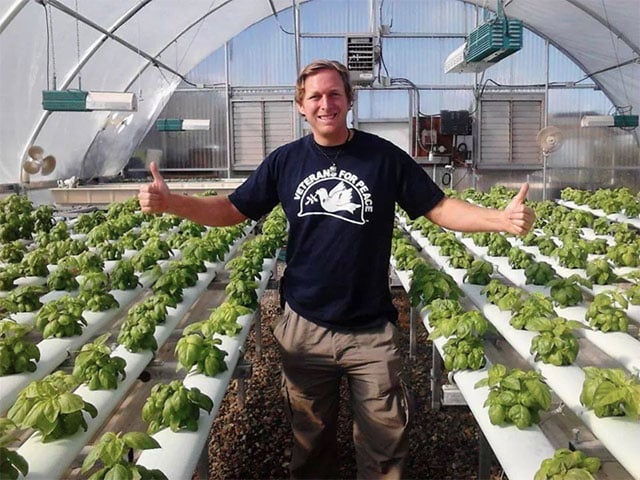 Mike Hanes, at Veterans Sustainable Agriculture Training, in San Diego, California. (Photo: Courtesy of Rory Fanning)
Mike Hanes, at Veterans Sustainable Agriculture Training, in San Diego, California. (Photo: Courtesy of Rory Fanning)
After combat in Iraq, I got out of the Marines within six months of getting back to the US. One of the greatest challenges that I have faced upon getting back was finding my place in society. After combat, I looked at the world differently. I couldn’t fit into any niche, and I still have that problem in many ways. I began to isolate, get into confrontations and self-medicate with alcohol. A huge problem for me was finding work. There seemed to always be something that would throw me off psychologically or physically which would always lead to bad results. Another thing I can’t wrap my head around anymore is slaving away for a company or corporation for eight hours a day, day in and day out, in perpetual, repetitive, monotonous tasks for enhancing corporate profits. I would rather walk out into the woods and live the remainder of my days off the land, away from this predatory society that does not care for you or me and motivates us through patriotism to send our kids to war. The war system and the connection to corporate profits, imperialism, acquiring resources, and maintaining strategic advantage over others has motivated me to do what ever peaceful actions I can to make this world one of empathy, caring, sanity and global peace.
Angry, shocked, overwhelmed? Take action: Support independent media.
We’ve borne witness to a chaotic first few months in Trump’s presidency.
Over the last months, each executive order has delivered shock and bewilderment — a core part of a strategy to make the right-wing turn feel inevitable and overwhelming. But, as organizer Sandra Avalos implored us to remember in Truthout last November, “Together, we are more powerful than Trump.”
Indeed, the Trump administration is pushing through executive orders, but — as we’ve reported at Truthout — many are in legal limbo and face court challenges from unions and civil rights groups. Efforts to quash anti-racist teaching and DEI programs are stalled by education faculty, staff, and students refusing to comply. And communities across the country are coming together to raise the alarm on ICE raids, inform neighbors of their civil rights, and protect each other in moving shows of solidarity.
It will be a long fight ahead. And as nonprofit movement media, Truthout plans to be there documenting and uplifting resistance.
As we undertake this life-sustaining work, we appeal for your support. We have 7 days left in our fundraiser: Please, if you find value in what we do, join our community of sustainers by making a monthly or one-time gift.